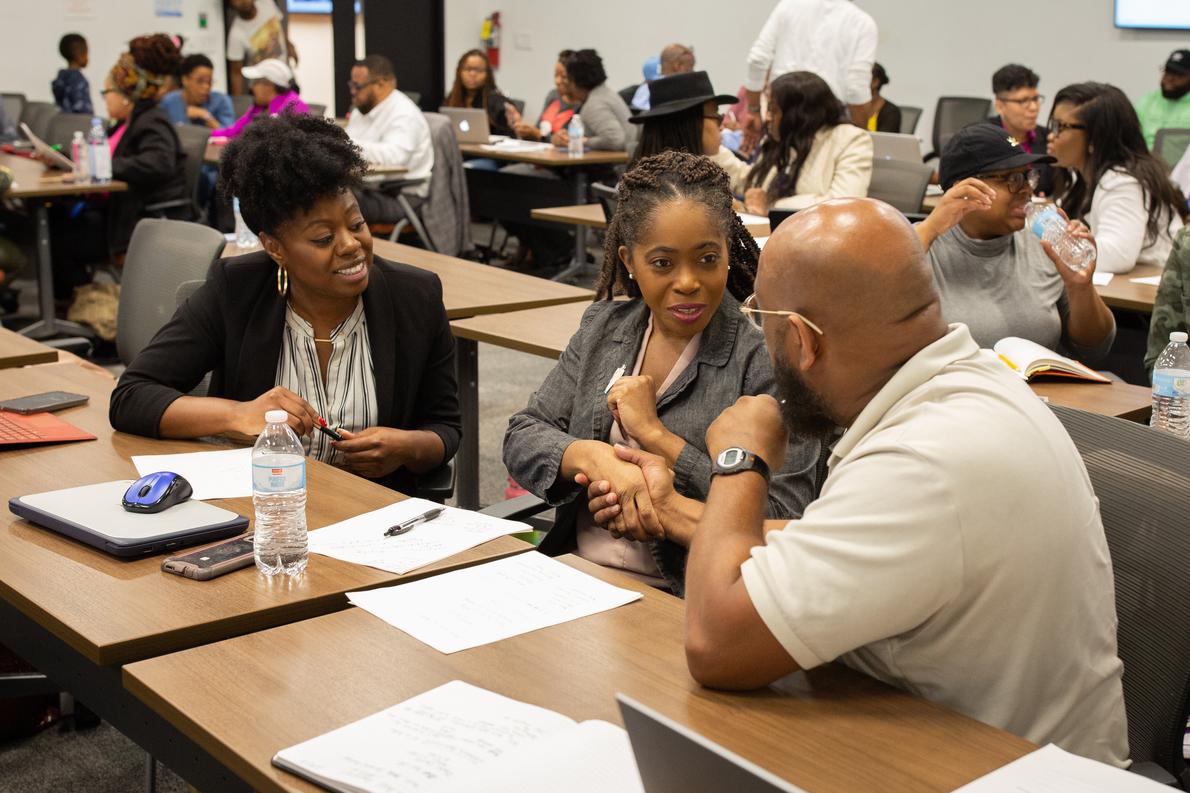Small Businesses in the Digital Economy: How Corporate-Community Partnership Models Level the Playing Field for Underserved Entrepreneurs and Their Communities

In local communities, organizations that support the launch and growth of small businesses are vital actors. While these organizations may partner with the corporate sector, the focal point of those relationships is sometimes skewed toward funding. Capital is a necessity, but perhaps the ecosystem could equip more small businesses to scale and succeed with a focus on other resources. Through hybrid models of technology and coaching that are marked by a personalized approach, these organizations can become force multipliers for growth in local communities
What does this mean? Many small businesses struggle to scale because they simply do not have access to valuable information, resources, and training that could empower them to grow. Without this information, microbusinesses are not equipped to even measure the suitability of the tools and training that may be available. Further, many corporations do not have the localized people to deliver trainings, trusted guidance, and other vital resources. This is where nonprofits step in as local partners to meet entrepreneurs where they are to address varying degrees of digital literacy and capacity.
When corporations and nonprofits join forces to execute programs in a skill knowledge sharing model, small business growth is inevitable. This is particularly true when those resources place concentrated focus on helping small businesses establish and expand their digital footprint. Empower by GoDaddy (Empower) is a perfect case study of this concept. This partnership between Association for Enterprise Opportunity (AEO) and GoDaddy, launched in 2019, provides a premium digital marketing curriculum and expert support and services to business owners across the country. Through a 12-month program, AEO member organizations are equipped to deliver the programming in their local markets by utilizing GoDaddy resources and working with dedicated staff members from AEO and GoDaddy. In turn, entrepreneurs in underserved communities receive the training, tools, and networks that help them thrive in the digital space.
The proof of why such partnerships are vital lies in the numbers. In a Fall 2020 survey of small businesses, GoDaddy found that 60 percent of respondents said their website helped them successfully navigate COVID-19. What implications does this have for underserved demographic groups such as women or Black entrepreneurs? What is the impact on local economies? According to the survey, women are 36 percent more likely than men to depend on a website as a main source of income. Similarly, Black entrepreneurs are the most likely to have an online-only business. Yet in many cases, there is a confidence gap that has a very tangible impact on an entrepreneur’s ability to navigate the digital space. This puts them at a significant disadvantage in today’s digital economy.
Through Empower, several takeaways on how to help entrepreneurs overcome these gaps and acquire digital savvy have been discovered. The first step to unlocking these strategies is recognizing the intimidation and stress that comes with being an entrepreneur, particularly when there is a skills gap. The empathy of that realization is what drives the delivery of three critical resources: personalized training and coaching; a portfolio of trusted guidance; and, a robust peer network.
The bottom line about all business is that it is relational. That principle holds true for business support providers as well. The digital space is vast, which can make it intimidating. A lack of relatability or connection in the coaching relationship can add to that sense of feeling overwhelmed. That is why personalized solutions must be a part of the process. Corporations and practitioners must also keep in mind that every entrepreneur has a different story and set of challenges. This was revealed throughout the Empower by GoDaddy cohort. Jared Bare, owner of TeTched Customs and a WESST participant in Albuquerque, New Mexico shares his story:
“I was so frustrated with various platforms and approaches that did not deliver my vision until I enrolled in Empower by GoDaddy. Within weeks, the program gave me the support I needed to create a website, blog and the digital experience that I had imagined and especially needed running my business during COVID.”
This is just one of many instances where cookie cutter programming falls short. In its Fall 2020 Venture Forward report, GoDaddy found that there is no one-size-fits-all solution. Programs need to be customized based on unique and localized challenges and opportunities facing entrepreneurs. Individualized, empathetic coaching relationships are a vital component of bringing this concept to fruition.
In addition to a one-on-one experience, it is vital for corporations that provide support to be prepared to answer the question of “what now?” when a program ends. Digital fluency is but one of many areas where entrepreneurs need support and guidance. In order to inspire genuine trust and confidence in the entrepreneurs they serve, corporations and their nonprofit partners must connect entrepreneurs with trusted guidance that can address other needs like access to capital and cash flow management. Often, there is an interconnectedness between a lack of digital fluency and other areas of the entrepreneurship experience. By connecting entrepreneurs to a diverse portfolio of resources, practitioners and corporations demonstrate that they truly understand the nuances of what entrepreneurs need.
Entrepreneurship can be an isolating experience, and gaps in knowledge or skills can exacerbate that isolation due to fear of embarrassment or even being taken advantage of by bad actors. By sharing success stories of other entrepreneurs, and including the HOW of that success, corporations and their partners can further close the confidence gap by showing entrepreneurs that the barriers they face are common and can be overcome. Additionally, this storytelling further exposes entrepreneurs to entities that can serve as safe spaces for them to seek resources and guidance.
As we continue living in the new normal of digitization, it will be critical for the microenterprise ecosystem to bear these realities in mind as programming is developed moving forward. As corporations and nonprofits partner to empower entrepreneurs for success, relationships will continue to stand alongside information as a primary resource that will help entrepreneurs and communities across America recover and thrive in the digital space—and in their bottom lines.

